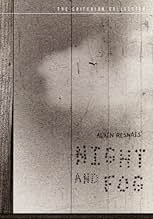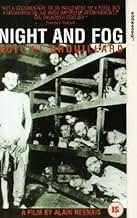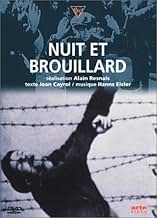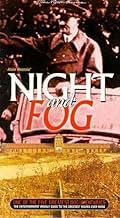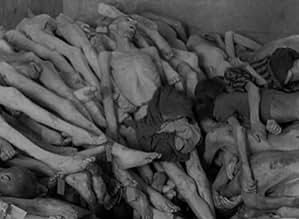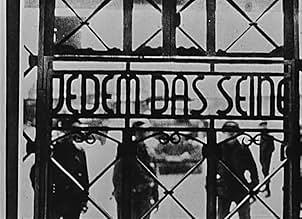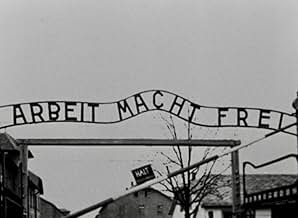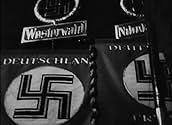The history of Nazi Germany's death camps of the Final Solution and the hellish world of dehumanization and death contained inside.The history of Nazi Germany's death camps of the Final Solution and the hellish world of dehumanization and death contained inside.The history of Nazi Germany's death camps of the Final Solution and the hellish world of dehumanization and death contained inside.
- Nominated for 1 BAFTA Award
- 2 wins & 1 nomination total
- Narrator
- (voice)
- (uncredited)
- Self
- (archive footage)
- (uncredited)
- Self
- (archive footage)
- (uncredited)
- Self
- (archive footage)
- (uncredited)
- Self
- (archive footage)
- (uncredited)
- Director
- Writer
- All cast & crew
- Production, box office & more at IMDbPro
Featured reviews
This movie is probably the best holocaust documentary ever made. The images of piles of human hair, emaciated skeletons being pushed around by bulldozers, lampshades of human skin, men looking like corpses walking around, has never left me. The opera and classical music in the background helps to further add to the shock value of this film.
After about 10 minutes, kids in my class told my teacher we didn't want to watch this movie anymore. We stopped it and there was still 30 minutes left in class. We didn't learn anything about economics that day, we talked about the holocaust instead.
Included on the DVD is an excerpt from a 1994 radio interview with Resnais, wherein he mentions French censors required the film makers to obscure the hat of a policeman guarding prisoners being deported - the French government refused to permit this recognition of French complicity and assistance with the deportations.
Another purpose is to show the ultimate failure of the Nazis at Nuremburg to take responsibility for it. It would have been welcome to also depict the complicity of others: big business, the other victims of the Nazi's, similar atrocities such as the My Lai massacre, ethnic cleansing, genocide, state violence and so forth but this was not possible given the length of the film and its purpose. Today, when there is so much holocaust denial, people need to be reminded not that the Nazis were demons but of the consequences of unchecked state power without an ethical base.
The film opens in 1955 with an image of a barren field of grass with lush romantic music in the background. The scene then abruptly shifts to wartime. We are in Auschwitz and the prisoners are arriving. We are shown scenes shot after liberation that are so shocking that they have never been made public outside of this film. Resnais does not spare us: the hair shaved off the heads of women piled high on the floor, bodies -- men -women - children -- are tossed in a garbage pit like so much rubbish, their fat used to make soap. The film only lasts a short time, but the images remain indelible. Unwillingness to acknowledge responsibility is depicted in brief scenes of the Nuremberg Trials. As we witness the conscious distortion of the past still going on today, we are left numb.
Did you know
- TriviaIn the DVD re-release, there is a subtle but controversial difference in one of the still photographs of a Nazi concentration camp in southern France. In this version the distinctive profile of a French gendarme can be seen at one of the camps, implying that the French Vichy government of the time was aware of and perhaps involved in the management of the camps. This same photograph appears in the original version but the gendarme's profile was obscured at the insistence of the French government (who commissioned the film) when the film was in post-production.
- GoofsIn the film a popular myth about the Third Reich is presented as fact: The claim that the body fat of prisoners in extermination camps was used to produce soap. Though evidence does exist of small-scale soap production, possibly experimental, in the camp at Stutthof concentration camp near Danzig/Gdansk, mainstream scholars of the Holocaust consider the idea that the Nazis manufactured soap on an industrial scale to be part of World War II folklore.
- Quotes
Récitant/Narrator: With our sincere gaze we survey these ruins, as if the old monster lay crushed forever beneath the rubble. We pretend to take up hope again as the image recedes into the past, as if we were cured once and for all of the scourge of the camps. We pretend it happened all at once, at a given time and place. We turn a blind eye to what surrounds us and a deaf ear to humanity's never-ending cry.
- Alternate versionsBefore its original release, there was a still of a French gendarme (policeman) watching a roundup at Pithiviers. He is easily recognizable by the characteristic French "kepi." Wanting to deny complicity, French censors insisted this shot not be allowed, so for its original release, the image was altered so that a wooden beam covered the gendarme and his kepi. In 1997 or 98, the original version of the film was re-released in France, finally revealing the gendarme. The original American release of the film did not translate all the dialogue for the subtitles, in particular leaving out one of the two references to Jews: "Annette, from Bordeaux." Subsequent releases restored the original text: "Annette, a Jew from Bordeaux."
- ConnectionsEdited from Les camps de concentration (1945)
Details
- Runtime32 minutes
- Color
- Sound mix
- Aspect ratio
- 1.37 : 1
Contribute to this page


